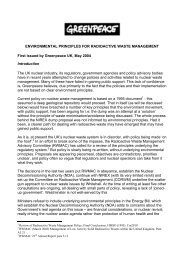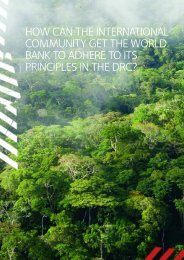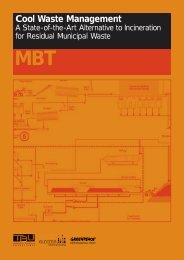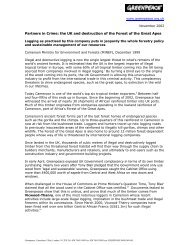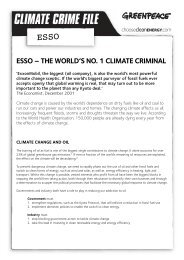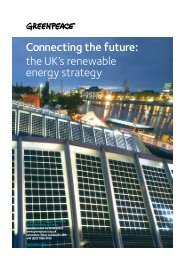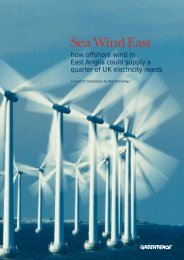Partners in mahogany crime - Greenpeace UK
Partners in mahogany crime - Greenpeace UK
Partners in mahogany crime - Greenpeace UK
Create successful ePaper yourself
Turn your PDF publications into a flip-book with our unique Google optimized e-Paper software.
Executive summary<br />
paper protection for the Amazon<br />
Almost ten years ago, world leaders gathered <strong>in</strong> Rio de Janeiro, Brazil. The meet<strong>in</strong>g, known as the Earth<br />
Summit, became one of the def<strong>in</strong><strong>in</strong>g moments of the fight to reverse the worldwide trend <strong>in</strong> environmental<br />
degradation. Together, more than 180 countries recognized the harm be<strong>in</strong>g <strong>in</strong>flicted on our fragile earth<br />
and vowed to put the world on a more susta<strong>in</strong>able path. Central to this was the Convention on Biological<br />
Diversity (CBD). This legally b<strong>in</strong>d<strong>in</strong>g agreement was <strong>in</strong>tended to provide a comprehensive framework for<br />
the protection of the world’s threatened natural habitats, <strong>in</strong>clud<strong>in</strong>g ancient forests and the life that<br />
depends upon them.<br />
A decade later, the world’s ancient forests are still wait<strong>in</strong>g for governments to keep their Earth Summit<br />
promise. Today, some 80% of the world’s forests have been degraded or destroyed. The Amazon<br />
ra<strong>in</strong>forest is no exception. Last year deforestation of the Brazilian Amazon was greater than at any time<br />
s<strong>in</strong>ce 1995. 2<br />
Fuelled by high <strong>in</strong>ternational market demand, <strong>mahogany</strong> (Swietenia macrophylla) is driv<strong>in</strong>g<br />
the destruction of the ra<strong>in</strong>forests of the Brazilian Amazon.<br />
The vast majority of Brazil’s <strong>mahogany</strong> is exported. Luxury products from Brazilian <strong>mahogany</strong> are sold <strong>in</strong><br />
some of the most prestigious retail outlets <strong>in</strong> the world’s wealthiest countries. But the glamourous image<br />
hides a corrupt <strong>in</strong>dustry that is underm<strong>in</strong><strong>in</strong>g traditional cultures, and lead<strong>in</strong>g the illegal destruction of the<br />
world’s most precious ancient forest, critical to the survival <strong>in</strong> the wild of creatures such as the jaguar.<br />
Often referred to as ‘green gold’, <strong>mahogany</strong> can fetch over US$1,600/m 3 . Illegal <strong>mahogany</strong> opens the door<br />
for illegal logg<strong>in</strong>g of other species, and for widespread exploitation of the Brazilian Amazon. The Brazilian<br />
Government’s assessment of the problem is that 80% of all Amazon timber orig<strong>in</strong>ates from illegal sources.<br />
At the core of illegal logg<strong>in</strong>g is widespread corruption.<br />
Despite many years of campaign<strong>in</strong>g by NGOs such as <strong>Greenpeace</strong>, the plethora of domestic and<br />
<strong>in</strong>ternational agreements, action programmes and laws pledg<strong>in</strong>g to protect the Amazon or control the<br />
<strong>mahogany</strong> trade have proved hopelessly <strong>in</strong>adequate. Over the last decade, numerous <strong>in</strong>ternational<br />
agreements have been signed to protect species such as <strong>mahogany</strong> and the rema<strong>in</strong><strong>in</strong>g <strong>in</strong>tact ancient<br />
forests <strong>in</strong> which <strong>mahogany</strong> occurs. These <strong>in</strong>clude the Convention on Biological Diversity (CBD), the Group<br />
of Eight (G8) Nations’ Action Programme on Forests and the Convention on International Trade <strong>in</strong><br />
Endangered Species (CITES). These agreements are not work<strong>in</strong>g.<br />
Recent <strong>Greenpeace</strong> <strong>in</strong>vestigations <strong>in</strong> the Brazilian state of Pará reveal just how<br />
deeply rooted the problem rema<strong>in</strong>s. No reliable legal cha<strong>in</strong> of custody exists<br />
for <strong>mahogany</strong>. Illegality is widespread. The key players are ruthless.<br />
This report sets out the evidence and names many of the key actors <strong>in</strong>volved<br />
<strong>in</strong> the supply and trade of illegal <strong>mahogany</strong> from Brazil. Osmar Alves Ferreira<br />
and Moisés Carvalho Pereira are two k<strong>in</strong>gp<strong>in</strong>s <strong>in</strong> the state of Pará, which<br />
supplies the vast majority of Brazil’s <strong>mahogany</strong> trade. Illegal <strong>mahogany</strong> is<br />
laundered through fraudulent use of official documents. By the time it is<br />
shipped from the Amazon, the <strong>mahogany</strong> appears legal and its illegal orig<strong>in</strong>s<br />
are untraceable.<br />
<strong>Greenpeace</strong> <strong>in</strong>vestigations <strong>in</strong> Pará <strong>in</strong> 2001 reveal illegal<br />
<strong>mahogany</strong> on Indian lands<br />
©<strong>Greenpeace</strong><br />
Ferreira and Moisés are connected to at least five export companies –<br />
Exportadora Peracchi/Serraria Cotia, Tapajos Timber, Semasa, Madeireira<br />
MCP and Juary/Jatoba – that together control around 80% of exports from<br />
the state of Pará. On the import<strong>in</strong>g side, just four companies <strong>in</strong> the North –<br />
Aljoma Lumber, DLH Nordisk, J Gibson McIlva<strong>in</strong> Co Ltd and<br />
Intercont<strong>in</strong>ental Hardwoods – account for over 80% of the trade.<br />
1 <strong>Partners</strong> <strong>in</strong> <strong>mahogany</strong> <strong>crime</strong><br />
Amazon at the mercy of ‘gentlemen’s agreements’


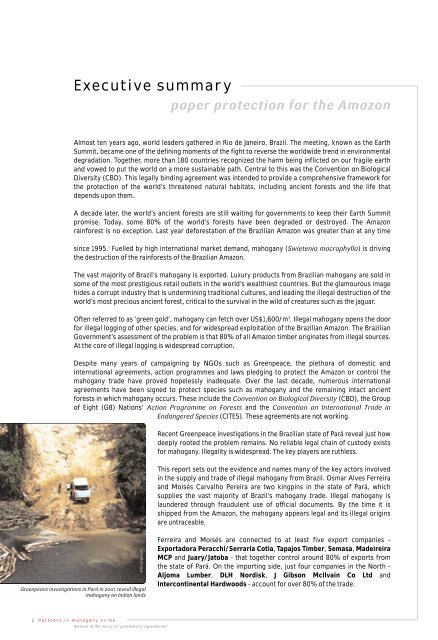

![[2007] EWHC 311 - Greenpeace UK](https://img.yumpu.com/22079793/1/184x260/2007-ewhc-311-greenpeace-uk.jpg?quality=85)

